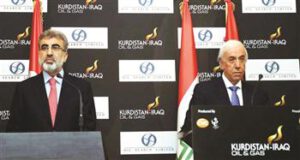Turkey pushes for a tripartite mechanism to be formed with Iraq and the Kurdish Regional Government for the sale of northern Iraqi oil and gas.
 Turkey is seeking to form a tripartite mechanism between Turkey, Iraq and the Kurdish Regional Government (KRG) for the sale of northern Iraqi oil and gas, thus drawing a skeptical Baghdad into the arrangement.
Turkey is seeking to form a tripartite mechanism between Turkey, Iraq and the Kurdish Regional Government (KRG) for the sale of northern Iraqi oil and gas, thus drawing a skeptical Baghdad into the arrangement.
“We stand by the agreement we made with northern Iraq, but we hope it can be carried out through a three-way mechanism,” Turkish Energy Minister Taner Yıldız said at the 3rd Kurdistan-Iraq Oil and Gas Conference in Arbil, the KRG capital.
“As Turkey, we are trying to move this forward in a careful and courteous way … We would like to have the consent of the central government of Iraq for the commercial export of oil from the KRG to Turkey and start a trilateral cooperation scheme that will be beneficial to all,” Yıldız said.
A day before the conference, he met with Iraqi Deputy Prime Minister for Energy Hussain al-Shahristani in Baghdad, to try to mend ties with the central Iraqi government, which says independent Kurdish oil exports would be illegal. Turkey-KRG deals have recently contributed to a souring of relations between Ankara and Baghdad.
At the conference, Yıldız also held a meeting with KRG President Masoud Barzani. The two reportedly spoke about a roadmap for oil deals that would include Baghdad, which is currently bypassed by the KRG.
However, as yet they have been unable to reach a final agreement with Baghdad, a source told Anadolu Agency, adding that “problems remained” and the process would have to continue with reciprocal negotiations and meetings.
‘Deals not a risk for anyone’
KRG Prime Minister Nechirvan Barzani said oil deals with Turkey did not pose risks to against any sides and nobody should worry, speaking during the opening ceremony of the conference, Cihan News Agency reported. Barzani stressed that they wanted a “common life,” particularly with regard to authority over the oil and the income partnership.
He also said they had been in talks with neighboring countries, Turkey and Iran, for the last two years, adding that these discussions did not only include oil and energy, but also encompassed political and economic strategy.
Last week, Turkey and Nechirvan Barzani signed five trade contracts and one protocol for exploration of northern Iraq’s multi-billion-dollar hydrocarbon resources.
As part of the deal, state-backed Turkish Energy Company (TEC), which Ankara set up to work in northern Iraq, has signed a contract to operate in 13 exploration blocks. In about half of those, it will team up with U.S. oil giant ExxonMobil.
The move comes amid news that a pipeline, which is linked to the existing Kirkuk-Ceyhan line, could begin pumping oil exports from Iraqi Kurdistan as early as next month, infuriating Baghdad, which insists all energy sales should be made via the central government.
In response to Turkey’s move on energy contracts with the KRG, Baghdad barred Turkish private planes from flying to Iraq’s autonomous Kurdish region on Nov. 30. A Turkish private plane flying to the Kurdish region was turned back late Nov. 29, a Turkish official confirmed.
A written statement from spokesperson of the Turkish Foreign Ministry, Levent Gümrükçü, followed the reports of airspace ban.
Baghdad says Kurdish efforts towards oil independence could lead to the breakup of Iraq, and the dispute has also raised concern in Washington.
Autonomous since 1991, the KRG has often chafed against the central government and even threatened to secede, but still relies on Baghdad for a slice of the OPEC producer’s $100-billion-plus budget.
HDN















